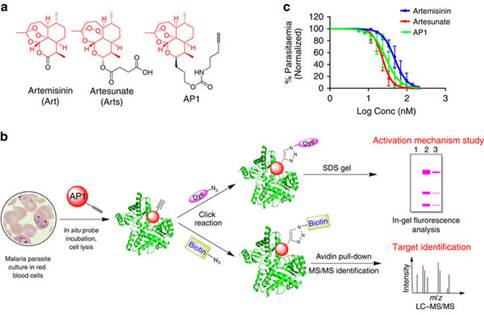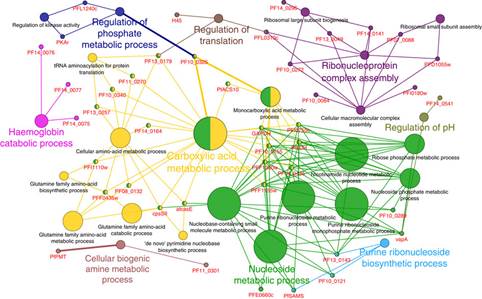


英国《自然-通讯》杂志22日公布的一篇寄生虫学论文,揭示了抗疟疾药物青蒿素的作用机制——确定青蒿素可针对100多种蛋白质发生作用。这项研究同时显示,青蒿素会被血红素这种特定的含铁化合物激活。
目前对于疟疾最有效的药物就是青蒿素,以其为主的联合疗法成为世界卫生组织推荐的抗疟疾标准疗法,尤其在疟疾重灾区非洲,青蒿素已经拯救了上百万生命。青蒿素需要二价铁的存在才能激活,但是对于这种铁的来源以及该药物针对的蛋白质究竟有哪些,一直存在争议。
此次,新加坡国立大学林青松和他的研究团队,开发出一种有化学标记的青蒿素类似物来显示青蒿素是如何针对恶性疟原虫中的蛋白质发挥作用的。恶性疟原虫是感染人疟疾致病性最强的寄生虫。
研究中,团队成员发现124种蛋白质会被激活后的青蒿素结合,即青蒿素发生作用,而且这种结合是无法逆转的。其中很多蛋白质均参与了寄生虫必需的一些生物过程,这就可以解释为什么青蒿素是如此有效的一种药物。另外,研究人员还表明,血红素是提供激活青蒿素所需的铁的主要来源。
虽然很可能还存在其他的药物靶点,但是这些研究有助于了解青蒿素是如何杀死疟原虫的。论文作者表示,鉴于世界上一部分地区如今出现了对于青蒿素的耐药性,这些结果可能有助于促进开发出更好的治疗疟疾的代替方法。
此外,10月份的一项报告显示,对于青蒿素有耐药性的疟原虫不仅可以感染东南亚当地的几种蚊子,还可以感染一种非洲的常见蚊子。这意味着抗疟疾药物青蒿素的耐药性目前虽然只在东南亚存在,但也有可能会蔓延到世界其他地方。
科技改变生活
许多神药,我们并不知道为何有效。比如青蒿素,居然是靠结合124种蛋白质来杀虫,药物机理的难以捉摸就在于此。在如此厉害角色的逼迫下,疟原虫仍然变异出了耐药种类,顽强的生命力可见一斑。未来人类还会针对青蒿素的弱点研发新药,而疟原虫也很可能在新一轮剿灭后死灰复燃。人与病原之间的军备竞赛永无止境。(来源:科技日报)
Haem-activated promiscuous targeting of artemisinin in Plasmodium falciparum
Abstract The mechanism of action of artemisinin and its derivatives, the most potent of the anti-malarial drugs, is not completely understood. Here we present an unbiased chemical proteomics analysis to directly explore this mechanism in Plasmodium falciparum. We use an alkyne-tagged artemisinin analogue coupled with biotin to identify 124 artemisinin covalent binding protein targets, many of which are involved in the essential biological processes of the parasite. Such a broad targeting spectrum disrupts the biochemical landscape of the parasite and causes its death. Furthermore, using alkyne-tagged artemisinin coupled with a fluorescent dye to monitor protein binding, we show that haem, rather than free ferrous iron, is predominantly responsible for artemisinin activation. The haem derives primarily from the parasite’s haem biosynthesis pathway at the early ring stage and from haemoglobin digestion at the latter stages. Our results support a unifying model to explain the action and specificity of artemisinin in parasite killing.
原文链接:http://www.nature.com/ncomms/2015/151222/ncomms10111/pdf/ncomms10111.pdf



